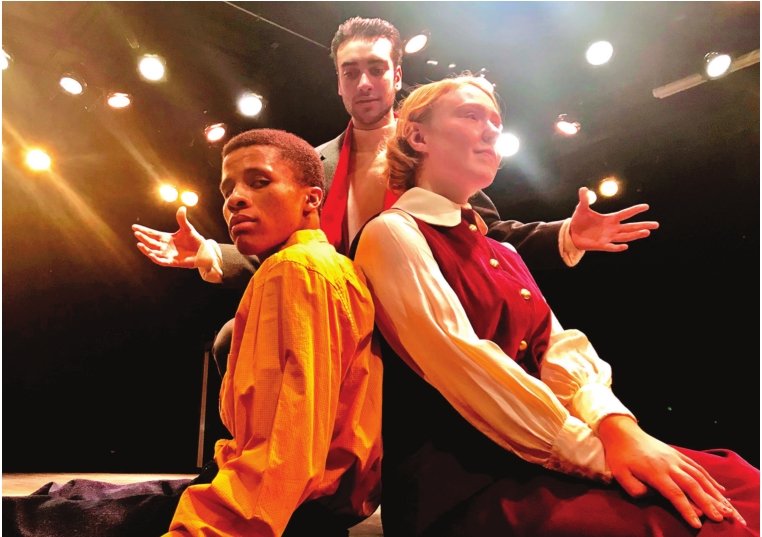
Michigan State University’s Department of Theatre has an outstanding history of producing plays that address critical social and cultural issues. From “In the Blood” to “Baltimore” to “Punk Rock,” MSU boldly embraces challenging theater. With its latest production, “Thus With a Kiss I Die,” the department ratchets up the challenge by creating an immersive experience that puts the audience sometimes uncomfortably close to the toxicity of human hostility.
Those who have been to a murder mystery dinner will be familiar with the immersive nature of “Kiss,” although this production is that experience on steroids. “Kiss” takes place at the fictional Jekyll University in 1958. The theater department has brought in a progressive guest director (Raied Jawhari) for its production of “Romeo and Juliet.” This “New York Jew” has made it his mission to bring Northern values to this Southern college by casting a black Romeo (Evan Philips) with a white Juliet (Jamie Lien).
The experience begins with a tense opening night, the audience already primed for trouble as characters mill about the auditorium pre-show, hissing and sniping at each other. As the play-within-the-play begins, the tension onstage grows as the plot progresses toward the kiss alluded to in the title.
The show is interrupted by a crime, at which the audience is pressed into service by the local sheriff (Zack DeBrabander) .
This is where the immersive experience kicks into high gear. Conceived and directed by MSU’s head of acting and directing Rob Roznowski, the production spans two floors, hallways, three theater spaces and a rehearsal room as well as nooks and crannies throughout the building. The audience is invited to follow characters through the building, or stay planted in a space and watch as the characters come and go. The logistics alone are amazing, as the audience is split up and brought back together several times so that they can share key information about the larger story that might otherwise be missed.
Although race is the key conflict in “Kiss,” Roznowski has drafted subplots that reflect several contemporary issues plaguing the United States. One subplot that I experienced was witnessing the drama department’s costumer, an immigrant from China (the heartbreakingly earnest Hongwen Lu), being bullied by a group of mean girls who accuse her of taking jobs away from their mamas.
Because one can’t follow each individual character, I can’t describe in detail the stories of other characters. This is good, as it avoids spoilers. To whet the reader’s appetite for this behind-the-scenes intrigue, I will share a few stories that I think were happening. One subplot involves an inappropriate relationship between a white college administrator (Jeff Litten) and his black subordinate (Jala Jackson). Another seems to involve sexual violence perpetrated by a male student (Kyle Parsley) on perhaps several women. Another cast member seems to have either a mental illness, a drug problem, or both (Brandon Drap). The entitled starlet (Isabel Rodriguez) who expected she’d be Juliet has an overbearing stage mother (Isabella Stenz) who may be instilling body insecurities in her daughter. The director seems to be unhappy in his marriage, masking his misery with prescription drugs to control his aggression toward female cast members.
These are but a few of the stories one could follow. There is possibly a subplot about homophobia, which I missed completely but others undoubtedly witnessed. This is the beauty of this production: every audience member will come away with a unique experience and different takeaway lessons. At the opening night performance, I was particularly touched watching Joseph, who plays Romeo, explain to Maggie, who plays Juliet, that while the kiss might cost her her reputation, it could cost him his life. Philips and Lien are perfectly cast, as the gawky and seemingly powerless duo experience an achingly tender loss of innocence. They are baby birds who have recently left the nest and are now learning about the opportunities for both cruelty and kindness in the bigger world.
The sole weakness of the show is that the sheriff wraps the play up with lines that border on preachy and do not read as authentic for a Southern sheriff of the era. Audience members from Michigan who would choose to come to this play don’t need to be blatantly told that the times they should be a changin’. Roznowski might consider refining a slightly less obvious yet still poignant denouement for future productions of the work.
As with most immersive theater experiences, there is a large cast of characters, many of whom have legitimate motives for committing the crime. This means that even if one went to every performance and followed the same characters, the outcome at the end could change as the sheriff reveals the culprit. “Kiss” is literally a new experience at every performance. While few people have the ability to attend every performance, this is a show that warrants repeating at least once. Fortunately, at the time of the publication of this review, there are still seven chances to choose your own Jekyll University adventure.
“Thus With a Kiss I Die” Through Feb. 25
7:30 p.m. Wednesday & Thursday 8 p.m. Friday & Saturday 2 p.m. Saturday & Sunday Fairchild Theatre
General admission, $17; seniors, $15; students $12
1.800.WHARTON whartoncenter.com
Support City Pulse - Donate Today!
Comments
No comments on this item Please log in to comment by clicking here